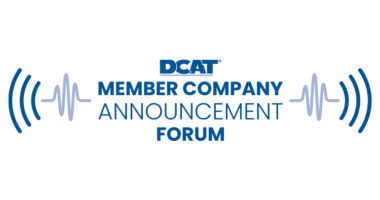What’s New in Biologics
With biologics assuming a greater portion of the industry’s pipeline and commercialization strategies, what are key trends and company activity in this sector? To expanding roles of niche modalities in cell and gene therapies to advances in bioprocessing, DCAT Value Chain Insights takes an inside look.
Key trends in biologics
Biologics and new drug approvals trending higher. Thus far in 2019, the percentage of new molecular entities (NMEs) approved by the US Food and Drug Administration’s (FDA) Center for Drug Evaluation and Research (CDER) is trending higher than historical levels. As of July 3, 2019, the FDA’s CDER had approved 14 new molecule entities (NMEs), and of these approvals, five or 36% were biologics. In 2018, approximately 29% of NME approvals, which included one antibody drug conjugate, were biologics, which is consistent with recent levels. In 2017, 26% of NME approvals were biologics, and in 2014 and 2015, 27% of NME approvals were biologics. The outlier was in 2016, when a lower number of NME approvals occurred with 22 NME approvals, of which 32% were biologics. Although full-year results for NME approvals for 2019 may bring the level of biologic-based NME approvals in line with historical levels, through the first half of 2019, biologic NME approvals are trending higher than recent levels.
The five biologics approved thus far in 2019 are: AbbVie’s Skyrizi (risankizumab-rzaa) for treating moderate-to-severe plaque psoriasis; Amgen’s Evenity (romosozumab-aqqg) for treating osteoporosis; Evolus’ Jeuveau (prabotulinumtoxinA-xvfs) for treating so-called “frown lines”; Roche’s Polivy (polatuzumab vedotin-piiq) for treating relapsed or refractory diffuse large B-cell lymphoma; and Sanofi’s Cablivi (caplacizumab-yhdp) for treating thrombotic thrombocytopenic purpura, a rare blood-clotting disorder.
Biologics in the industry’s oncology pipeline. Oncology represents the largest therapeutic sector in the global pharmaceutical industry, and biologics surpass small-molecules in the industry’s late-stage oncology pipeline. Global spending on oncology treatments reached nearly $150 billion in 2018, according to a recent analysis, Global Oncology Trends 2019: Therapeutic, Clinical Development and Health System Implications, by the IQVIA Institute for Human Data Science. By 2023, IQVIA projects that the total oncology drug market will reach between $200 billion and $230 billion and between $220 billion and $250 billion when supportive-care products are included. In 2018, in the industry’s late-stage oncology pipeline of 849 drug candidates, 50.3% were biologics and 40.3% were targeted small molecules, which excludes non-specific therapies such as cytotoxic agents.
Within the clinical pipeline, activity is most intense for the nearly 450 immunotherapies currently in development, which are identified with more than 60 different mechanisms of action (MOA), according to the IQVIA analysis. At the same time there are more than 100 next-generation biotherapeutics, defined as cell, gene, and nucleotide therapies, in clinical trials focusing on 18 different MOAs. The number of these next-generation biotherapeutics (cell, gene and nucleotide therapies) in development for oncology has more than doubled since 2013 and grew 32% from 2017 to 2018.
New modalities: cell and gene therapies. Cell and gene therapies are a niche product area, but the market for them is on the rise. With cell therapy, cells are cultivated or modified outside the body before being injected into the patient, where they become a “living drug.” With gene therapy, genes are replaced, inactivated or introduced into cells—either outside or inside the body—to treat a disease. Cell and gene therapies are designed to halt a disease or reverse its progress rather than simply manage symptoms. They are often one-time treatments that may alleviate the underlying cause of a disease and have the potential to cure certain conditions. The market for cell therapies was valued at $2.70 billion in 2017 and is expected to reach $8.21 billion in 2025, growing at a compounded annual growth rate of 14.9% between 2017 and 2025, according to a recent analysis by Frost and Sullivan.
Chimeric antigen receptor (CAR) T cell therapies are one type of cell therapy and represent a type of immunotherapy that involves a one-time infusion of a patient’s own immune cells that have been genetically modified to recognize and attack cancer. The US Food and Drug Administration (FDA) has approved two CAR T therapies: Novartis’ Kymriah (tisagenlecleucel), the first CAR T therapy approved by the FDA in 2017 for treating certain types of leukemia, and Gilead Sciences’ Yescarta (axicabtagene ciloleucel), initially approved in 2017 for treating diffuse large B-cell lymphoma, and gained by Gilead through its $11.9-billion acquisition of Kite Pharma, a cell and gene therapy company, in 2017.
Earlier this year, AveXis, a Novartis company, received FDA approval for Zolgensma (onasemnogene abeparvovec-xioi), the first gene therapy for pediatric patients with spinal muscular atrophy (SMA), a rare neuromuscular disorder that results in the loss of motor neurons and progressive muscle wasting.
In December 2017, Spark Therapeutics, which is being acquired by Roche, received FDA approval for its gene therapy, Luxturna (voretigene neparvovec-rzyl), to treat children and adult patients with an inherited form of vision loss that may result in blindness. Luxturna was the first directly administered gene therapy approved in the US that targets a disease caused by mutations in a specific gene, according to the FDA. It has been subsequently authorized for marketing in the European Union.
Manufacturing activity in cell and gene therapies. Cell and gene therapies have been a recent active area of investment by both pharmaceutical companies to add products to their pipelines and manufacturing capabilities and by certain contract development and manufacturing organizations (CDMOs) and contract manufacturing organizations (CMOs) to add cell-therapy manufacturing capabilities to their toolbox.
Earlier this year (2019), Novartis acquired CELLforCURE, a CDMO of cell and gene therapies in Europe, from LFB, a French pharmaceutical company. The acquisition included a cell and gene manufacturing facility located outside of Paris in Les Ulis, France and the related adjacent land. The site joins Novartis’ network of cell and gene therapy sites that include sites in Morris Plains, New Jersey and Stein, Switzerland.
In 2018, Novartis made a large play in gene therapy with its $8.9-billion acquisition of AveXis, a Bannockburn, Illinois-headquartered clinical-stage gene-therapy company. Earlier this year (April 2019), AveXis announced it had agreed to purchase an advanced biologics therapy manufacturing campus in Longmont, Colorado, to expand its manufacturing capacity for its gene therapy, Zolgensma (onasemnogene abeparvovec-xioi). The Longmont facility will add to AveXis’ manufacturing network. AveXis has a manufacturing facility in Illinois, is building a manufacturing facility in North Carolina that is scheduled to be operational in 2020, and is expanding its product-development capacity at its San Diego facility.
Following its $11.9-billion acquisition of Kite Pharma in 2017, Gilead announced in 2018 that it had leased and purchased new facilities in the US and Europe to expand its cell-therapy manufacturing capabilities. Kite has leased a new 117,000-square-foot site facility in Hoofddorp, the Netherlands to engineer cell therapies, including for Yescarta. The new facility is scheduled to be fully operational in 2020. In addition to the Netherlands facility, Kite purchased a new building in Santa Monica, California from Astellas Pharma that will be used for cell-therapy research, development, and the expansion of clinical manufacturing capabilities. Kite also leased a 26,000-square-foot facility in Gaithersburg, Maryland. The Maryland site will support the work of a new Cooperative Research and Development Agreement with the National Cancer Institute to develop adoptive cell therapies targeting patient-specific tumor neoantigens. This year (April 2019), Kite announced plans for a new facility in Frederick County, Maryland, to produce cell therapies. The 20-acre site will expand Kite’s ability to manufacture a variety of CAR T, therapies, including Yescarta (axicabtagene ciloleucel), Kite’s first commercially available CAR T cancer therapy, and investigational T cell receptor (TCR) cell therapies being evaluated in solid tumors. The Frederick County facility will become part of Kite’s commercial manufacturing network that includes sites in California and the Netherlands.
Celgene, which acquired Juno Therapeutics, a company developing cell therapies and immunotherapies, in 2018 for $9 billion, announced in February 2018 that it completed the first phase of a new immunotherapy manufacturing center for CAR T therapies at its Summit West campus in New Jersey. Earlier this year (February 2019), Roche agreed to acquire Spark Therapeutics, a commercial gene-therapy company based in Philadelphia, for $4.3 billion, in a deal that is still pending with regulatory review. The acquisition would net Roche a gene-therapy manufacturing facility. In a smaller investment, last year (2018), Astellas Pharma announced the construction of new research, development, and manufacturing facilities for biologic-based modalities, including antibodies and cell therapies, in Japan and Massachusetts. Novo Nordisk announced in 2018 plans to establish a manufacturing site in Fremont, California to develop and produce stem cell-based therapies with the facility scheduled to be operational in 2019.
Among CDMOs/CMOs, key deals completed this year to build manufacturing capabilities in cell and gene therapies are Catalent’s $1.2-billion acquisition of Paragon Bioservices, a Baltimore, Maryland-based contract provider of viral vector development and manufacturing services for gene therapies, and Thermo Fisher Scientific’s $1.7-billion acquisition of Brammer Bio, a CDMO of viral vector manufacturing for gene and cell therapies.
Biomanufacturing advances. In a recent industry roundtable in DCAT Value Chain Insights, select industry members highlighted key trends in biologics, including biomanufacturing. Key trends include: (1) wider acceptance of single-use technologies; (2) a transition to smaller bioreactor tank sizes due to lower product volumes as biopharmaceutical companies target smaller patient populations and cell-line expression is improving; and (3) the adoption of next-generation production technologies, which include in-line media and buffer preparation, single-pass tangential flow filtration, and continuous multi-column chromatography technologies. Emerging technology advances include: (1) continuous bioprocessing; (2) related process-intensification strategies with the aim of designing smaller volume processes and increasing manufacturing flexibility; (3) at-line/in-line process monitoring to enable continuous bioprocessing and improve analytics; and (4) modular bioprocessing facilities to reduce manufacturing footprints and also to increase flexibility.





